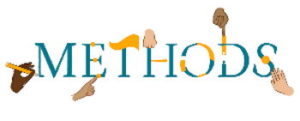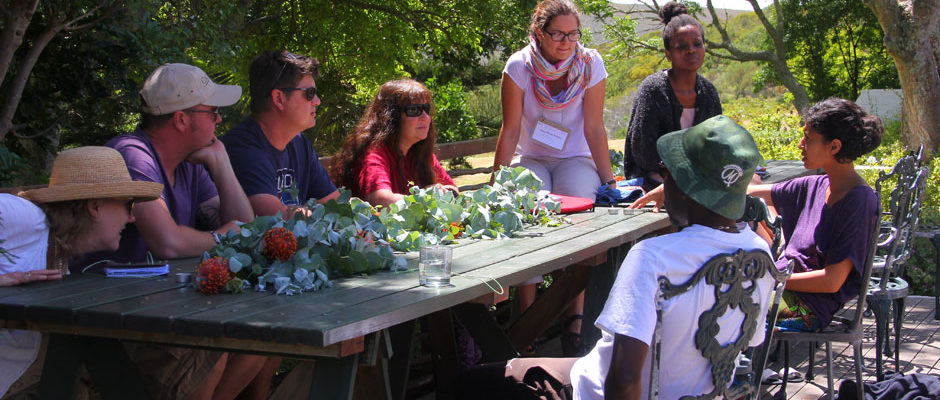Throughout 2021, through a series of virtual events, we explored a wide range of methods that sustainability researchers are using and combining to both generate knowledge and contribute to positive change. Researchers working on different sustainability challenges around the world shared their experiences of, and lessons – both positive and negative – from transdisciplinary methods.
In this post, we’ll discuss how methods are linked to the different roles that researchers play. To illustrate some different perspectives on this, we include extracts from a virtual conversation between three researchers held at the end of 2021.
Methods and roles
Methods have contexts. We understand them as situated within ‘methodological infrastructures’: disciplinary cultures, research funding processes and timelines, accepted formats and languages of deliverables, and so on. We also recognise that methods are constitutive of individual and collective practices.
Our conversations therefore were not simply about methods as tools to explore particular issues in the world: we also considered how they are intimately related to the many roles that researchers play when engaging in sustainability challenges.
So what might these roles look like? When supporting knowledge generation as well as influencing change in the world, we work across a spectrum of roles that address different modalities of research.
At one end of the spectrum might be what is characterised as traditional, arms-length ‘ivory tower’ research. Here, a researcher might do everything possible to avoid influencing the system they are studying.
At the other end might be highly participatory action research. Here, the objective of the research includes actively influencing the system that’s being studied. The focus is on generating actionable knowledge about that system and the process of change.
In fact, both of these extremes are caricatures. In practice, as most sustainability researchers have experienced, the reality is far messier.
A framework for thinking about researchers’ roles
The ambiguities and blurred lines between researchers’ roles are brought to life by the ‘six modes of co-production’ framework developed recently by Chambers and colleagues.
The framework includes four key dimensions of researcher roles in co-production: purpose (why do actors co-produce), power (the way in which human agency is conceptualized), politics (how are power relations changed) and pathways (how are impacts catalysed), to develop a typology of six modes.
Each of the six modes is a different mix of these four dimensions to achieve different types of outcomes, whether that be researching solutions; empowering voices; brokering power; reframing power; navigating differences or reframing agency.
Reflections on varying roles from different perspectives
To understand how researchers view their roles and their connection to methods, we held a virtual conversation with three sustainability researchers in late 2021.
All were part of a network of researchers focused on African Food Systems and Transformation led by the University of Leeds: Andy Challinor (University of Leeds), Chikondi Chabvuta (Care International) and Marina Apgar (Institute of Development Studies).
Each used a short ‘pecha kucha’ style presentation to share their journeys to becoming the researchers they are today. They reflected on how they navigate tensions as they play varying roles in support of just transformations.
Andy Challinor
Andy Challinor is a climate modeller who studies how climate variability affects crops and food systems. He works with a range of models, with varying emphases on process, data, and empirical learning.
Andy talked about the tensions in how the models are used for multiple intended audiences – including millions of farmers, or policy makers at the UN or World Bank. Andy brings together a range of different experts who translate the output of the models to stimulate discussion, in order to increase their relevance and usability for policy making.
[embedyt] https://www.youtube.com/watch?v=dCEz0HUxB5g[/embedyt]Marina Apgar
Marina Apgar is an action researcher who works on social and environmental justice issues with communities from across the world. The nature of her work involves interdisciplinary research with a range of researchers, practitioners and policymakers. They may have very different backgrounds and epistemologies, and are often seeking different outcomes.
As an action researcher, Marina stressed the importance of being nimble. She needs to switch between many action research hats – sometimes playing the role of facilitator or advocate, but sometimes simply being the ‘furniture arranger’ in order to provide the space for discussion and debate.
Chikondi Chabvuta
Chikondi Chabvuta is an advocacy adviser for Care International, working on gender social norms and food systems programmes in Malawi. Chikondi works with communities to understand existing social norms and aims to understand whether these change over time as a result of Care’s programmes.
This work aims to achieve a number of outcomes – including generating knowledge and researching solutions, empowering voices, and reframing power and beliefs, whilst at the same time building evidence for advocacy.
Tensions: ambiguity, certainty, complexity and simplicity
In our discussion we delved into two tensions: firstly, the tension between ambiguity and certainty; and secondly, that between complexity and simplicity, which is expressed across both the purpose of research and the needs of those who might engage with or make use of the research.
Andy discussed how, in climate modelling, ambiguity (and being comfortable with ambiguity) can open up important discussion and critique.
Modellers aim for a degree of simplicity in their models, to help understand and interpret a more complex reality. Andy’s research process recognises the tension between the complexity of the real world and the simplicity of a model. This means that the results of his modelling are one input, among others, into a sense-making process.
In this process, a range of subject experts are able to reintroduce some of the nuance and complexity, in order to explore potential solutions and pathways to change.
This openness and ambiguity is desirable when engaging other researchers (modellers and social scientists) but this can be problematic when engaging with policymakers. Policymakers often ask for clear messaging and certainty – something that is not a given, when there is inherent simplification and uncertainty in the use of models.
Pressures for clarity and impact
Similarly, Chikondi highlighted that, in research for the purposes of advocacy, there is a demand for clarity of messaging and calls for action. As a consequence, there is often a pressure to ‘close down’ potential options so that there is a clear policy ‘ask’.
Much of Marina’s action research operates across a number of modes, but often has a strong emphasis on empowering voices. Marina highlighted the importance of being really mindful, when engaging in modes of co-production which seek to influence power dynamics, that there are often risks of exacerbating existing power asymmetries.
For example, Official Development Assistance (ODA) funded research can often come with a pressure to tick the ‘impact’ box. This can lead researchers to work with the most influential stakeholders in a given context. This can very easily risk further disempowering people whose voices aren’t usually heard, perpetuating and exacerbating existing power dynamics. This pressure can also lead to pursuit of the fastest change over the (often slower) more just and more equitable change.
Managing multiple roles in seeking just transformations
Stephen Whitfield and colleagues from the GCRF Challenge Cluster developed a framework for examining justice in food system transformations research in which the responsibility of researchers to reflect on their roles is highlighted.
When working with marginalised populations in multi-stakeholder processes, it is very easy for the more powerful and influential to ‘capture’ the process. As a result, the transformation that are produced may result in actually making things worse for the marginalised.
Building awareness of the potential for ‘unjust’ transformations, and understanding the power dynamics at play to monitor these risks, becomes part of embracing ambiguity as we navigate different modes of co-production.
More information
 To find out more about the STEPS Centre’s 2021 programme of events and discussions on methods, see Challenging Research.
To find out more about the STEPS Centre’s 2021 programme of events and discussions on methods, see Challenging Research.
For more on sustainability and methods, visit our Methods portal and browse publications, case studies, examples and other resources.
